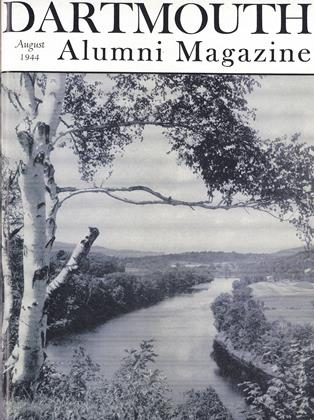A SPECIAL COMMITTEE on Academic Adjustments, authorized to pass upon exceptional matters of admission, academic credit and degree requirements for Dartmouth students returning from military service, was established by the Board of Trustees of the College at its annual spring meeting on June 9.
The committee, headed by Prof. W. Stuart Messer and consisting of both faculty and administrative members, has been empowered to deal with each case individually and, without impairment of academic standards, to recommend admission or a degree for a man "even though his credentials might not be exactly those which would qualify him under any of the formulae conventionally existent and necessary in the nature of faculty requirements." It will determine the amount of credit to be given for work done during the period of military service, will approve the courses at Dartmouth or elsewhere that will be accepted as meeting the requirements of the bachelor's degree, and will recommend directly to the Trustees men for the bachelor's degree supplementary to those recommended by the faculty in regular course.
In addition to Chairman Messer, the special committee includes three other members representative of the faculty: Dean Bill, Prof. Bancroft Brown and Prof. Andrew G. Truxal. Administrative members of the committee are Dean Neidlinger, Dean Strong, and Prof. Francis J. Neef, director of the Personnel Bureau.
The vote of the Dartmouth Trustees creating the committee and defining its authority was passed as follows:
At the request of the President and upon representation from him of the number and complexities of the problems that are arising in regard to academic adjustments with individual men following the war, it is voted to appoint a Special Committee on Academic Adjustments with the following authority pertaining to men who have been in the services: 1. To determine upon what basis eligibility shall be assumed to rest in cases of individual men returning from the armed services who wish to continue their studies at Dartmouth though never originally having been accepted under the requirements of the selective process; done during the period of military service by men previously enrolled at Dartmouth and returning or by others to whom admission shall be granted: 3. To approve the courses (if any are needed) at Dartmouth or elsewhere that will be accepted as meeting in full the requirements for the Bachelor's degree; 4. To recommend directly to the Trustees men for the Bachelor's degree supplementary to those who may be recommended by the faculty in regular course and who have met the requirements stipulated by the committee, as well as men who in the committee's judgment have met substantially degree requirements through special training while in service.
In statement to members of the committee in regard to the basis of their appointment, it is the desire of the Trustees that it be made plain that the purpose of the establishment of the committee is for the sake of handling the numerous individual cases without impairment of academic standards where-in essential justice would entitle a man to admission or to a degree even though his credentials might not be exactly those which would qualify him under any of the formulae conventionally existent and necessary in the nature of faculty requirements. In establishing the committee it is the hope of the Trustees that any tendency toward routine or group decisions be zealously avoided and that each case upon which the committee passes should be studied individually and that final recommendation to the Trustees should be made upon the individual merits of the man concerned.
CLASS OF 1919 GIFT. Edward E. Martin, chairman of 1919's 25th Anniversary Fund, presents a check for $25,300 to President Hopkins during the alumni officers' meetings in Hanover. Members of 1919 looking on are (I. to r.) Harry E. Colwell Jr., James C. Davis, Philip H. Bird, Windsor C. Batchelder, J. Kenneth Huntington, Roscoe A. Hayes, and Max A. Norton, bursar and assistant treasurer of the College. The fund, following the pattern of those given by the 25-year Classes in recent years, is the largest to date. Its annual income will be credited to the Class of 1919 total in the Alumni Fund each year.
 View Full Issue
View Full Issue
More From This Issue
-
 Article
ArticleA TEACHING LIBRARY
August 1944 By NORMAN K. ARNOLD -
 Article
ArticleTHE HISTORIC COLLEGE
August 1944 -
 Article
ArticleALUMNI OFFICERS MEET
August 1944 -
 Article
ArticleTHE 50-YEAR MESSAGE
August 1944 By REV. CHARLES C. MERRILL '94 -
 Class Notes
Class Notes1904
August 1944 By DAVID S. AUSTIN II, THOMAS W. STREETER -
 Article
ArticleMAN WITH COW SENSE
August 1944 By A. P.







